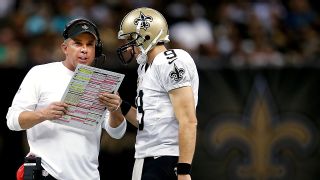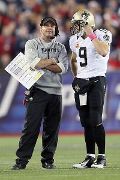|
The numbers are downright gaudy, even for the Big Easy. Since 2006, the unique, dynamic relationship between Saints coach Sean Payton and his best bud Drew Brees has produced a league-best 36,940 passing yards, 270 touchdowns, 3,187 completions and an eye-popping 67.2 completion percentage, not to mention NFL records for passing yards in a season (5,476 in 2011), completion percentage for a season (71.2 percent in 2011) and consecutive games with a TD pass (57). But as I researched the Payton-Brees duo for a story in the current QB Issue of the ESPN The Magazine -- a pairing for the ages Jon Gruden said belongs in the same lineage as Vince Lombardi and Bart Starr -- what I found was, despite all the wild numbers, all the shiny hardware and all the explosive plays you'll see jump off your screen Thursday night in Atlanta, if you drill down far enough, the real heart and soul behind this Payton-Brees partnership is actually a benevolent, thoughtful, silver-haired retired football coach by the name of J.R. Bishop.  Outside of his own parents, Payton says his relationship with Bishop was the most influential of his life. Watching the 2013 Saints, it's easy to see why. A former high school coach in Naperville, Ill., Bishop is the one who gave Payton, then an undersized QB himself, the blueprint that, 30 years later, he would turn into a record-breaking relationship with Brees. "To some degree I think Sean is like me as a coach ... and Brees does remind me of Sean a little bit on the field," says Bishop, 75, from his home in Illinois. "Sean was always a tremendous student of the game. He couldn't play good enough and the team couldn't play good enough to satisfy him, and nobody worked any harder than he did. Now if only he had worked as hard in my English class." Most of us are already familiar with Brees' amazing backstory. Prep star in Austin, Texas. Ignored by the Longhorns, settles on Purdue. Proceeds to break all the Big Ten passing records. But at just under 6 feet falls to second round of the draft. In five years with the Chargers builds himself into a Pro Bowl passer. Then, in 2005, 40 minutes from free agency, he suffers a rare and grotesque complete tear of the labrum in his throwing shoulder. On the open market, only the sad-sack Saints make an offer. He's grateful for the chance, but once again, despite all he's accomplished, Brees is asked to prove himself all over again to the football gods. He is humbled and humiliated by the one thing he loves most in the world: football. And Brees will spend the rest of his career working tirelessly at even the most mundane aspects of quarterbacking in order to return the favor on defenses every single chance he gets. Now, if you wonder why a goody-goody like Brees would find his football soul mate in a wild-man coach like Payton, see if any of this sounds familiar. Raised in the Chicago suburb of Naperville, at 5-foot-11 the undersized Payton made up for his physical limitations with a relentless drive to master the mental side of the game. (Sound familiar?) Obsessively competitive and a natural-born leader, Payton would sneak game film home for extra study during the week. (Sensing a pattern yet?) On Fridays he would sit in Bishop's office and pick through the game plan, highlighting plays he liked and eliminating the ones he didn't. (How about now?)  Bishop says that when Payton wasn't in the game, the young QB would stand by him on the sidelines to relay intel from the field and study every decision the coach made. (Just glance at the Saints' sideline tonight between series in Atlanta.) "Sean was smarter than most quarterbacks," says Bishop. "He had input during games because I would ask for it. I wanted to know what was going on in his mind and what he was seeing on the field. The quarterback has a feel for the game and view of the defense that a coach has to admit he will never have." By the time he was a senior, Payton knew the game plan and his coach's tendencies so well that Bishop would occasionally let him call his own plays. Cut to 2013. "It's almost as if Drew and Sean have one brain working together," says Saints offensive coordinator Pete Carmichael. "It's sort of amazing." But it's hardly a coincidence. After Naperville, Payton went on to become a Division I-AA All-American quarterback at Eastern Illinois, the same school that produced Tony Romo. After going undrafted, Payton had a one-day tryout with the Chiefs. During the player strike in 1987, he crossed the picket line to play three games for Mike Ditka and the Chicago "Spare" Bears, completing eight of 23 passes for 79 yards, no touchdowns and one interception for a 27.3 passer rating as a replacement player. (We're done with the comparisons to Brees, if you couldn't tell.) In 1988, Payton bounced from the Arena League to the CFL and then all the way to the Leicester Panthers in a semi-pro beer league in England. Humbled and humiliated by the one thing he loved most in the world -- football -- Payton moved into coaching where he would spend the rest of his career working tirelessly at even the most mundane aspects of his profession in order to return the favor on defenses every single chance he got. "Sean ended up a greater coach than anything else," says Bishop, who moved from Naperville to Wheaton College, where he retired in 1995 as a member of the school's Hall of Fame. "And that's because he understood so well what his own players' wants and desires were, probably because of what he experienced when he was a player himself." Before he was named the Saints' head coach in 2006, for three seasons Payton was a member of Bill Parcells' staff in Dallas. Payton is no angel, obviously. He was suspended for the entire 2012 season because of his role in the Bountygate scandal. At times he can get too cute or risky with his play calling, just to remind everybody how brilliant he is. But you can't deny that he made two of the biggest decisions that have led to the Saints becoming (in a fair world) the face of the pass-happy, uber-entertaining, modern-day NFL instead of the far more popular Tom Brady, Peyton Manning and Aaron Rodgers. For starters, the Brees signing will go down as one of the greatest free-agent deals in history. What's more, though, when the Saints came calling for Payton, it would have been safe and typical in the copycat NFL for him to adopt the old-school draconian methods of Parcells, who has never been shy about his distaste for pretty-boy quarterbacks. Instead, Payton turned away from that and tapped into the relationship-building methods Bishop encoded on his football DNA some 30 years ago. "You have to have trust to be great in this game," says Saints tight end Ben Watson, who played six seasons with Brady and Bill Belichick in New England. "And there's an intimacy to the relationship between Sean and Drew that says this is a friendship that goes beyond just work or football. It feels more like family." The result has been revolutionary. As payback, perhaps, nearly every year since he took the job in New Orleans, Payton has invited coaches from Naperville down to the Saints training camp. "Sean treats me like a father figure, I guess," says Bishop. "Even though I used to holler at him quite a bit, Sean's been real good to me." As he should be. After all, all great Saints start out as Bishops.
|


